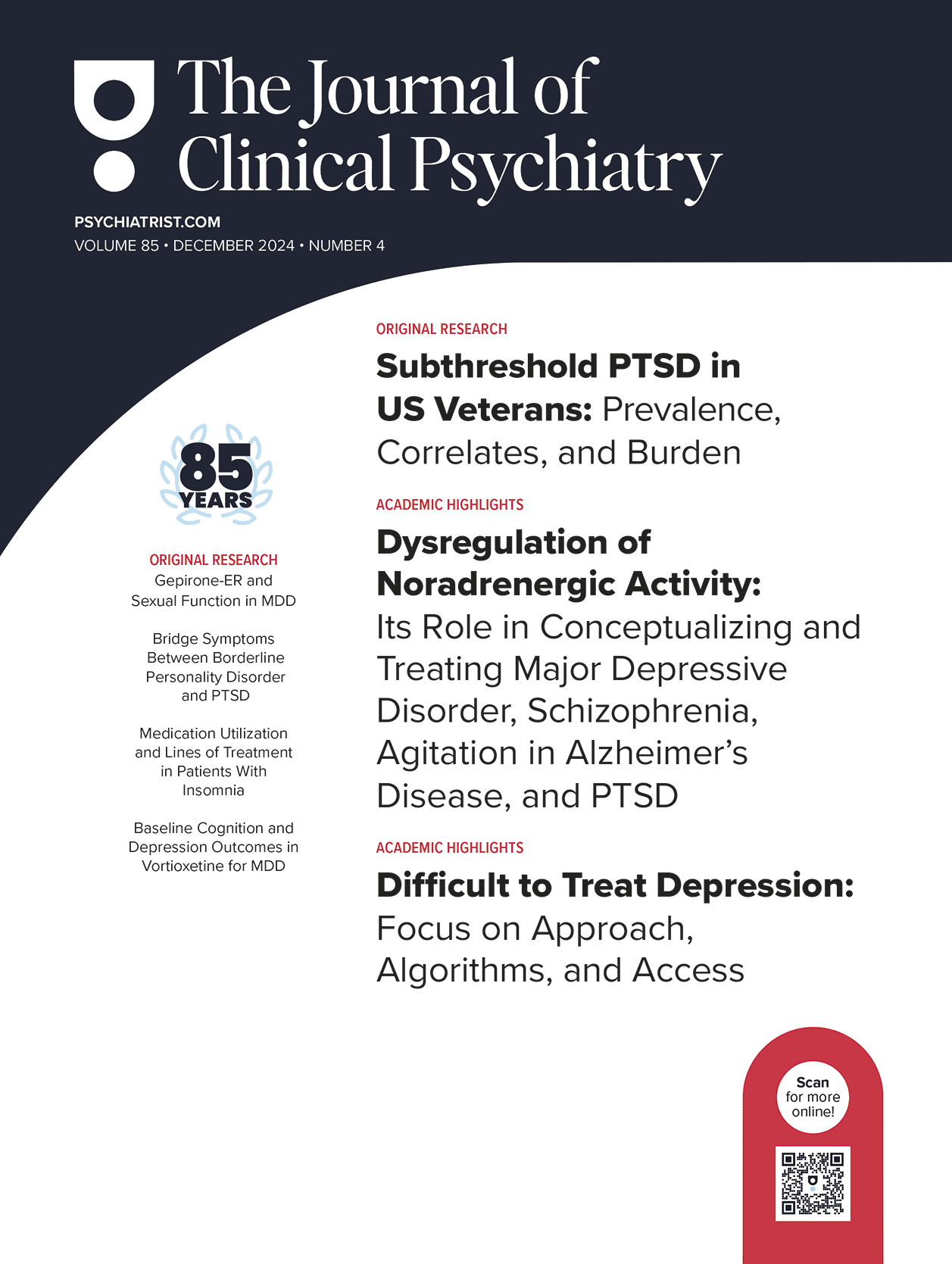ABSTRACT
Objective: Some individuals with attention-deficit/hyperactivity disorder (ADHD) may not tolerate or adequately respond to currently available treatments. This study examined whether solriamfetol could have a favorable pattern of effects and tolerability as a treatment for ADHD in adults.
Methods: Sixty adults with DSM-5 ADHD participated from August 2021 through January 2023 in a remotely conducted, randomized, double-blind, placebo-controlled, 6-week dose-optimization trial of 75 mg or 150 mg of solriamfetol. Measures included the Adult ADHD Investigator Symptom Rating Scale (AISRS), which was our primary outcome measure, as well as the Clinical Global Impressions scale (CGI), vital signs, the Global Assessment of Functioning (GAF), the Behavior Rating Inventory of Executive Function-Adult Form (BRIEF-A), the Epworth Sleepiness Scale (ESS), the Pittsburgh Sleep Quality Index (PSQI), and a modified Adult ADHD Self-Report Scale (MASRS).
Results: Solriamfetol was well tolerated, with no significant effect on mean heart rate (+3.7 vs +2.2 bpm, P = .5609), systolic blood pressure (+2.4 vs +1.5 mm Hg, P = .6474), or diastolic blood pressure (+1.1 vs +1.5 mm Hg, P = .8117). There was no statistically significant treatment effect on occurrence of adverse events. Compared to individuals on placebo, individuals on solriamfetol treatment experienced adverse events at a rate of at least 10 percentage points higher in the categories of decreased appetite, headache, gastrointestinal, insomnia, increased energy, cardiovascular, and neurologic. Compared to individuals on placebo, by study endpoint, a greater proportion of individuals in the treatment group met the a priori–defined treatment response (CGI score indicating much or very much improved and AISRS score reduced ≥ 25%: 45% vs 6.9%, P = .0020); those treated with solriamfetol also had greater improvement in total AISRS scores by week 3 through week 6 (P = .0012; week 6 effect size = 1.09). Significantly more solriamfetol-treated adults than placebo-treated adults had 0.5–standard deviation improvement in T-score on the BRIEF-A Global Executive Composite (P = .0173); those treated with solriamfetol also had greater mean change in GAF score (−4.8 vs −0.3, P = .0006) and greater mean MASRS total score change (P = .0047; effect size = 1.23). Mean ESS score improved more with solriamfetol than with placebo (P = .0056), but this difference did not predict AISRS response (P = .3735). There was no significant association between solriamfetol and change in PSQI scores.
Conclusions: Solriamfetol may be a novel and effective treatment for the management of ADHD in adults. Further replication in larger trials is indicated.
Trial Registration: ClinicalTrials.gov identifier: NCT04839562
J Clin Psychiatry 2023;84(6):23m14934
Author affiliations are listed at the end of this article.
Continue Reading...
Did you know members enjoy unlimited free PDF downloads as part of their subscription? Subscribe today for instant access to this article and our entire library in your preferred format. Alternatively, you can purchase the PDF of this article individually.
References (23)

- Simon V, Czobor P, Bálint S, et al. Prevalence and correlates of adult attention-deficit hyperactivity disorder: meta-analysis. Br J Psychiatry. 2009;194(3):204–211. PubMed CrossRef
- Fayyad J, Sampson NA, Hwang I, et al; WHO World Mental Health Survey Collaborators. The descriptive epidemiology of DSM-IV adult ADHD in the World Health Organization World Mental Health Surveys. Atten Defic Hyperact Disord. 2017;9(1):47–65. PubMed CrossRef
- Polanczyk G, de Lima MS, Horta BL, et al. The worldwide prevalence of ADHD: a systematic review and metaregression analysis. Am J Psychiatry. 2007;164(6):942–948. PubMed CrossRef
- Kessler RC, Adler L, Barkley R, et al. The prevalence and correlates of adult ADHD in the United States: results from the National Comorbidity Survey Replication. Am J Psychiatry. 2006;163(4):716–723. PubMed CrossRef
- Surman CBH, Walsh DM. Do ADHD treatments improve executive behavior beyond core ADHD symptoms in adults? evidence from systematic analysis of clinical trials. J Clin Pharmacol. 2023;63(6):640–653. PubMed CrossRef
- Brown TE, Landgraf JM. Improvements in executive function correlate with enhanced performance and functioning and health-related quality of life: evidence from 2 large, double-blind, randomized, placebo-controlled trials in ADHD. Postgrad Med. 2010;122(5):42–51. PubMed CrossRef
- Sunosi (solriamfetol) [package insert]. New York: NAT, Inc; June 2022.
- Goodman DW, Faraone SV, Adler LA, et al. Interpreting ADHD rating scale scores: linking ADHD rating scale scores and CGI levels in two randomized controlled trials of lisdexamfetamine dimesylate in ADHD. Prim Psychiatry. 2010;17:44–52.
- Kessler RC, Adler L, Ames M, et al. The World Health Organization Adult ADHD Self-Report Scale (ASRS): a short screening scale for use in the general population. Psychol Med. 2005;35(2):245–256. PubMed CrossRef
- Spencer TJ, Adler LA, Meihua Qiao, et al. Validation of the adult ADHD investigator symptom rating scale (AISRS). J Atten Disord. 2010;14(1):57–68. PubMed CrossRef
- Achenbach TM, & Rescorla, L.A. Manual for ASEBA Adult Forms & Profiles. 2003.
- American Psychiatric Association. Diagnostic and Statistical Manual of Mental Disorders: DSM-5. American Psychiatric Association; 2013.
- Aas IH. Guidelines for rating Global Assessment of Functioning (GAF). Ann Gen Psychiatry. 2011;10(1):2. PubMed CrossRef
- Busner J, Targum SD. The Clinical Global Impressions scale: applying a research tool in clinical practice. Psychiatry (Edgmont). 2007;4(7):28–37. PubMed
- Roth RM, Lance CE, Isquith PK, et al. Confirmatory factor analysis of the Behavior Rating Inventory of Executive Function-Adult version in healthy adults and application to attention-deficit/hyperactivity disorder. Arch Clin Neuropsychol. 2013;28(5):425–434. PubMed CrossRef
- Buysse DJ, Reynolds CF 3rd, Monk TH, et al. The Pittsburgh Sleep Quality Index: a new instrument for psychiatric practice and research. Psychiatry Res. 1989;28(2):193–213. PubMed CrossRef
- Johns MW. A new method for measuring daytime sleepiness: the Epworth sleepiness scale. Sleep. 1991;14(6):540–545. PubMed CrossRef
- Adler LA, Spencer T, Faraone SV, et al. Validity of pilot Adult ADHD Self- Report Scale (ASRS) to Rate Adult ADHD symptoms. Ann Clin Psychiatry. 2006;18(3):145–148. PubMed CrossRef
- Morris SB, DeShon RP. Combining effect size estimates in meta-analysis with repeated measures and independent-groups designs. Psychol Methods. 2002;7(1):105–125. PubMed CrossRef
- Statistical Analysis Software [computer program]. Users’ Guide Statistics Version 9.4. SAS Institute Inc; 2013.
- Cepeda M, Pham P, Shimbo D. Status of ambulatory blood pressure monitoring and home blood pressure monitoring for the diagnosis and management of hypertension in the US: an up-to-date review. Hypertens Res. 2023;46(3):620–629. PubMed CrossRef
- Surman CBH, Walsh DM. Managing sleep in adults with ADHD: from science to pragmatic approaches. Brain Sci. 2021;11(10):1361. PubMed CrossRef
- Weiss MD, Surman C, Khullar A, et al. Effect of a multi-layer, extended-release methylphenidate formulation (PRC-063) on sleep in adults with ADHD: a randomized, double-blind, forced-dose, placebo-controlled trial followed by a 6-month open-label extension. CNS Drugs. 2021;35(6):667–679. PubMed CrossRef
Please sign in or purchase this PDF for $40.
Save
Cite
Already a member? Login




